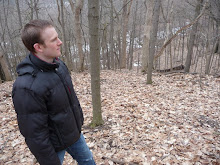I lift up my eyes to the hills. From where does my help come from?
My help comes from the LORD, the maker of heaven and earth.
- Psalm 121:1-2
Anyone who has owned a dog knows the futility of trying to point anything out to it. As intelligent as they are, dogs simply lack the powers of abstract thought that make humans unique. There is no intrinsic relationship between sign and signified, so if you try to point to a ball that is lying in the yard, the dog will come up and sniff your finger. It lacks the mental capacity to interpret from the sign (your extended finger) the existence of a no less real signified (the ball). While in the case of this example the ball is in fact an empirically verifiable object, it will remain entirely unobserved, for the dog will never learn to look past the sign. Yet although this power of abstract thought is one of the faculties that makes humans unique, many of us frequently deny ourselves its use.
Though cultural trends have been gradually shifting, there are still many in our society who consider it a mark of intelligence to disbelieve anything that cannot be empirically verified. Many boast of this, and many more operate under this presupposition without acknowledging it. Thus many deny the existence of God because he cannot be seen. In response to this, many Christians downplay the importance of the physical, or the logical, in support of the spiritual. The latter is almost as unfortunate as the former, for, among a host of other problems, it can create the attitude that faith is antithetical to reason. However, the perspective that the Bible gives is altogether different. The world that can be seen around us is undeniably real, yet the unseen world is not less real. Rather, it is more real, more substantial. The visible has been given to us as a sign to represent the invisible.
The Psalmist in Ps. 121 begins by looking up to the hills for a source of help. The mountains that surround Jerusalem provide a natural defense against enemies. The ridge of the hilltops is the place where a weary army looks in hope of reinforcements. Road up the mountains leads to the joy and safety of the Holy City, the end of a long and dangerous pilgrimage. The mountains are a symbol of hope and help, but they point higher. The help of the mountains is metonymic for the help that only God himself can give (that is to say, the mountains themselves are often part of that help, but God's help far transcends the aid of armies or the natural fortifications of geology). They serve as a sign to point us upwards. The wise person sees in the visible help of the mountains the no less true, though often less visible help of the unseen God. There are many who would see only the mountains, who would take pride in their refusal to see anything more. But in so doing, they restrict themselves to the sign, to the total neglect of the signified for which it was put in place. They are denying their God-given ability for abstract thought and restricting their mental capacities to only one of their functions.
While God created the entire universe to function as an enormous sign indicating his glory, humanity has persistently failed to recognize the Signified, desiring the signs for their own sake instead. The Bible calls this idolatry; the world calls it naturalism or materialism. In either case, the results are tragic and dehumanizing. Just like reading the words on this page without connecting them in anyway to the ideas behind them, such thinking necessarily ends in confusion, for signs were never meant to be an end in themselves. What can break us out of this futility? Many have tried to interpret the signs around them, and for many the mountains and hills have indeed directed them towards a spiritual understanding of the universe, yet they still fall short. Their reading is still faulty, for they have still failed to recognize properly what it is these signs indicate. It is only in Jesus Christ that sign and signified become one: the Word made flesh, the unseen God made visible, the Creator entering into his creation. In the incarnation, Jesus became the ultimate definition, for he was both the word and the meaning. He became the interpretative key by which we can understand all other signs. With Christ as our definition, the world around us, no less empirically real, now resounds with meaning, as everything points to something realer still. We look to the mountains, and the mountains point us higher.














